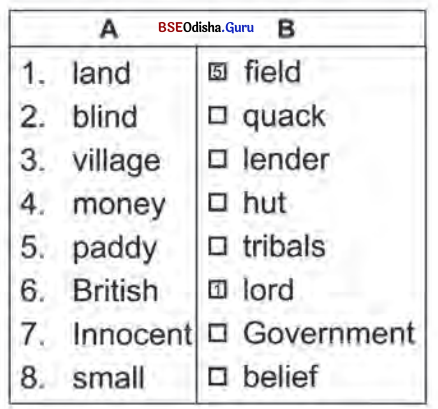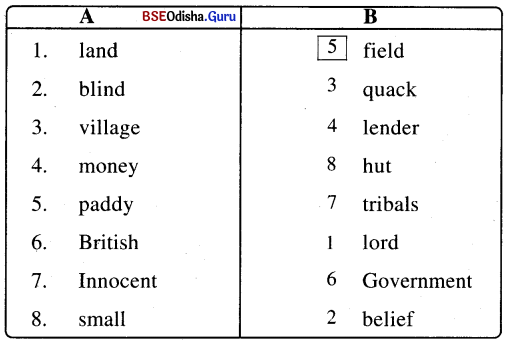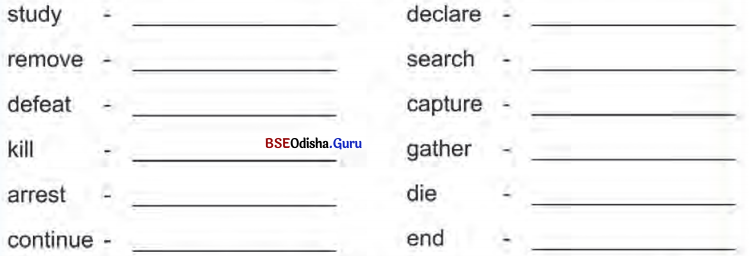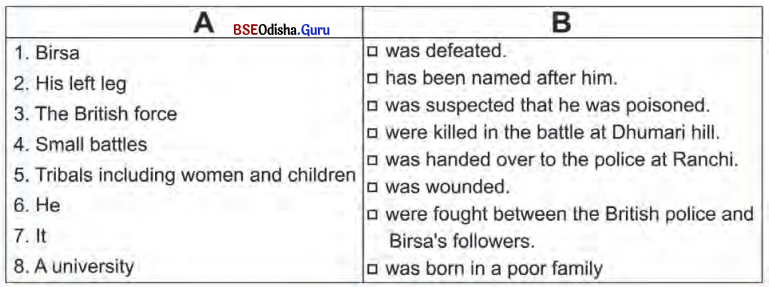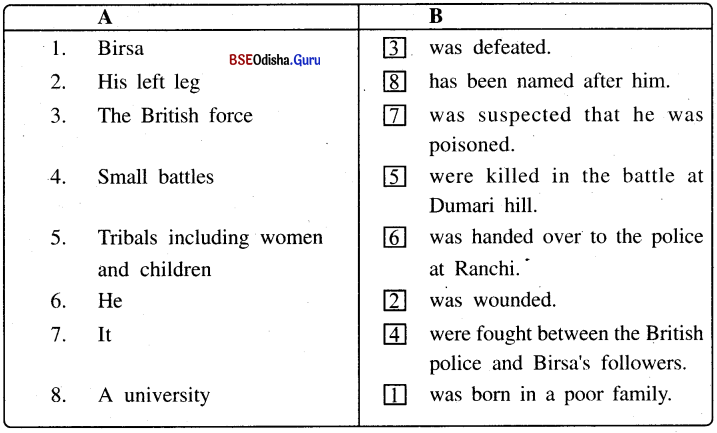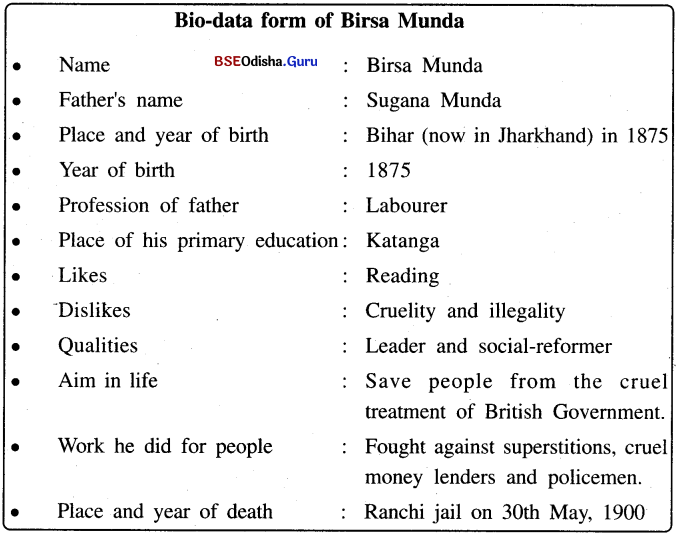Odisha State Board CHSE Odisha Class 11 Invitation to English 1 Solutions Poem 3 The Inchcape Rock Textbook Exercise Questions and Answers.
Class 11th Invitation English Poem Chapter 3 The Inchcape Rock Question Answers CHSE Odisha
The Inchcape Rock Class 11 Questions and Answers
Unit – I
Gist with Glossary
Gist:
The poet presents a picture of stillness. The air, the sea, the ship, her sails, and the ocean all look motionless. The slow rise and fall of waves failed to move the Inchcape Bell, a dangerous reef off the east coast of Scotland near the mouth of the river of Tay. During sunny days it could be easily noticed but during a storm, the ships would meet their death because of it. So to solve this problem the Abbot of Aberbrothok placed a bell on this rock. The bell would be heard loud and clear during a storm and as a result, would warn the sailors that the fatal Inchcape Rock was near. His humanitarian deed helped many a sailor know the presence of the dangerous rock. It was but natural that the Abbot of Abberbrothok won their blessings.
Glossary:
Stir: movement.(ଗତି)
Still: motionless. (ସ୍ଥିର)
Keel: bottom part of the ship. ( ଜାହାଜର ତଳଭାଗ)
Inchcape Rock: a perilous reef off the east coast of Scotland near the mouth of the river Tay.
Placed: fixed .(ଥୋଇଦେଲେ)
Buoy: a floating object on the sea to mark a dangerous rock. (ସମୁଦ୍ରରେ ଏକ ଭାସମାନ ବସ୍ତୁ |ଏକ ବିପଜ୍ଜନକ ପଥର ଚିହ୍ନ କରିବାକୁ |)
Surge’S Well: the rise of the tidal waves. (ଜୁଆରିଆ ଢେଉର ଉତ୍ଥାନ)
The Mariners: the sailors. (ମେରାଇନର୍ସ)
Perilous: dangerous. (ଭୟଙ୍କର )
Think It Out
Question 1.
How does the poet describe the Inchcape Rock?
Answer:
The poet states that the Inchcape Rock was a few inches high above the surface of the sea in low tide and was completely covered by the sea in high tide or when the sea was rough.
Question 2.
Was the Inchcape Rock dangerous? Give your reasons.
Answer:
The Inchcape Rock was quite dangerous because during sunny days the huge stone could be easily noticed, but it was completely covered by the sea at a high tide or when the sea swelled. As a result, many ships had been wrecked.
Question 3.
Why did the Abbot place a bell on the Inchcape Rock?
Answer:
The Abbot placed a bell on the Inchcape Rock to warn the sailors of the presence of this fatal rock nearby.
Question 4.
When did the Inchcape bell ring?
Answer:
The Inchcape bell rang during a storm or when the sea swelled.
Question 5
Why did the mariners bless the Abbot?
Answer:
Mariners blessed the Abbot because he saved many imminent shipwrecks during the storm by placing a bell on the perilous Inchcape Rock. In other words, humanitarian deeds gave them strength where nature was inhospitable.
![]()
Unit – II
Gist with Glossary
Gist :
The poet describes the cheering power of spring. The glittering sun, the screaming of seabirds, and the visible Inchcape filled the air with great joy. The beauty of spring made Sir Ralph the Rover, a sea pirate, cheerful beyond words. But his cheerful spirit gave way to mischief. His eye was fixed on the Inchcape Rock. The bell placed by the Abbot of Abberbrothok was a great disadvantage for him because he plundered the ships that were wrecked by the Inchcape Rock. So he decided to cut the bell from the rock. He was very happy now since there was no more bell. There was a lot more loot! The sailors would not bless the Abbot of Abberbrothok anymore.
Glossary:
Gay: here brightly. (ଆନନ୍ଦରେ )
screamed: made a loud high cry. (ଚିତକାର କରୁଥିଲେ)
wheeled: turned around quickly. (ହଠାତ୍ ବୁଲିପଡ଼ିଲେ)
speck: a very small part.(ଏକ କ୍ଷୁଦ୍ର ଅଂଶ )
He fell…. spring: The pirate Ralph the Rover was in high spirits because of spring, a season of joy and excitement.
His heart…….. excess: the pirate’s joy knew no limits.
But…. wickedness: His pleasure gave way to mischief.
Quoth: said (କହିଲେ)
Put Out: (here) make the ship ready (ପ୍ରସ୍ତୁତ କର)
I’ll…..Aberbrothok: Sir Ralph the Rover is determined to cause pain to the Abbot of Aberbrothok by cutting the bell.
Down……..sound: The bell sunk beneath the tide producing a low sound.
Think It Out
Question 1.
How does the poet express ‘the cheering power of spring’?
Answer:
The poet expresses the cheering power of spring in terms of the bright sun, screaming birds, and joy in their sounds. Merriment was in the air.
Question 2.
How did Ralph come across the Inchcape Bell?
Answer:
Ralph came across the Inchcape Bell by walking his deck and focusing his attention on it when spring set in and it surfaced on the calm sea.
Question 3.
What was the effect of ‘the cheering power of spring’ on Ralph?
Answer:
The cheering power of spring made Ralph whistle and sing and filled his heart with great delight.
Question 4.
What kind of a person was Ralph? Which line tells you so?
Answer:
Ralph was a wicked person to the backbone. The line ‘His heart was mirthful to excess’ tells us so.
Question 5.
What act of wickedness did he do?
Answer:
He committed a wicked deed by cutting the bell that the Abbot of Aberbrothok had placed on the dangerous Inchcape Rock.
Question 6.
Why did he do the wicked act?
Answer:
He did the wicked act because the sailors would not bless the Abbot of Aberbrothok.
![]()
Unit – III
Gist with Glossary
Gist :
As a result of his plundering spree, Sir Ralph the Rover became very rich in no time and came back to the shore of Scotland. It was a very stormy day. There was a thick haze and a strong gale and it was nearing nighttime. It was so dark that they could hot see the land. Sir Ralph tried to give his sailors courage by saying that the moon would soon appear and that they would be able to see. However, they still could not see and everybody wished they could hear the Inchcape bell. The ship soon struck the rock and everybody was in despair. Sir Ralph was cursing himself as the ship was sinking beneath the tide. Even as he was dying, Ralph could hear one dreadful sound. It was as if it was the warning sound of the Inchcape bell, it was as if it was the sound of the Devil ringing his knell.
Glossary:
scoured: searched for ships in the sea for plundering (ରେ ଜାହାଜ ଖୋଜିଲା | ଲୁଣ୍ଠନ ପାଇଁ ସମୁଦ୍ର)
Many A Day: many days (ଅନେକ ଦିନ)
Plunder: loot (ଲୁଣ୍ଠନ)
Loot: dense (ଘନ, ଘଞ୍ଚ)
Haze: fog (କୁହୁଡ଼ି)
Gale: storm (ଝଡ଼)
Died Away: stopped (ବନ୍ଦ ହୋଇଗଲା)
Canst: can
Swell: rise (ଉତ୍ଥାନ)
Strikes: hits (ବାଡ଼ି ହୋଇଗଲା )
Shivering: trembling ( ଦୋଳାୟମାନ )
‘Oh….. Rock’: The helplessness of the mariners is indicated by deep shock
Despair: misery (ଦୁର୍ଦ୍ଦଶା )
Dreadful : fearful (ଭୟଙ୍କର )
The Devil…. knell: This line signifies Ralph’s death.
Think It Out
Question 1.
How did Ralph become rich?
Answer:
Ralph became rich by plundering the ships that met with wrecks.
Question 2.
Why did the ship lose its way in the sea while it was heading towards Scotland?
Answer:
The ship lost its way in the sea while it was heading towards Scotland because of a dense fog and a strong gale. Besides, it was nearing nighttime.
Question 3.
Why did a mariner think that they were near the shore?
Answer:
A mariner thought that they were near the shore.
Question 4.
‘Oh, Christ! it is the Inchcape Rock’ – why did the mariners exclaim so?
Answer:
The mariners exclaimed so in their stale hopelessness. To their stunned disbelief, they feel the presence of the dangerous Inchcape Rock and consequently think of their imminent death. In Christ, they see their savior.
Question 5.
Why did Sir Ralph curse himself?
Answer:
Sir Ralph cursed himself because he realized that his notorious act of cutting the bell to tarnish the image of the Abbot of Aberbrothok paved the way for the sinking of his own ship in the roaring waves of the sea.
Question 6.
‘The Devil below was ringing his knell.’- what does this expression mean?
Answer:
The expression ‘The Devil below was ringing his knell’ means the death of the notorious Ralph the Rover. Even as he was dying, he could hear one fearful sound as if it was the warning sound of the Inchcape bell. It was as if the Devil was ringing the sound of his disaster.
Question 7.
Do you find this poem musical? The rhyme scheme of the first stanza is AABB (sea-A, be-A, motion-B, ocean-B). Is the rhyme scheme the same for all the stanzas?
Answer:
We find this poem completely musical. The poet’s profuse use of alliteration ‘S’ sea/ship/still and so on justifies this fact. The rhyme scheme is the same for all the stanzas.
![]()
CHSE Odisha Class 11 English The Inchcape Rock Important Questions and Answers
A.Short Answer Type Questions with Answers
1. Read through the extract and answer the questions that follow.
No stir in the air, no stir in the sea,
The ship was still as she could be,
Her sails from heaven received no motion,
Her keel was steady in the ocean.
Without either sign or sound of their shock
The waves flowed over the Inchcape Rock;
So little they rose, so little they fell,
They did not move the Inchcape Bell.
The Abbot of Aberbrothok
Had placed that bell on the Inchcape Rock;
On a buoy in the storm it floated and swung,
And over the waves its warning rung.
When the Rock was hid by the surge’s swell,
The mariners heard the warning bell;
And then they knew the perilous Rock,
And blessed the Abbot of Aberbrothok.
![]()
Questions :
(i) What picture do the first two lines present?
(ii) “Her sails from heaven received no motion;” What does the expression ‘Her sails’ refer to?
(iii) In spite of flowing over the Inchcape Rock, why didn’t the waves move its bell?
(iv) What made the Inchcape Rock unseen?
(v) What picture of the Abbot of Aberbrothok do you get in the extract?
Answers :
(i) The first two lines present a graphic description of calm nature. There is no movement either in the air or any roar in the sea. The ship was motionless,
(ii) The expression ‘Her sails’ refers to the ship’s sails.
(iii) The waves did not move Inchcape bell, in spite of flowing over the Inchcape Rock, because of their excessively slow rise and fall.
(iv) Rise of the tidal waves made the Inchcape Rock unseen.
(v) The extract presents a picture benevolence associated with the Abbot of Aberbrothok. His act of placing the bell on Inchcape Rock for the interest of the mariners is a case in point.
2. Read through the extract and answer the questions that follow.
The sun in heaven was shining gay,
All things were joyful on that day;
The sea-birds screamed as they wheeled round
And there was joyance in their sound.
The buoy of the Inchcape Bell was seen
A darker speck on the ocean green;
Sir Ralph the Rover walked his deck,
And he fixed his eye on the darker speck.
He felt the cheering power of spring;
It made him whistle, it made him sing;
His heart was mirthful to excess.
But the Rover’s mirth was wickedness
![]()
Questions :
(i) How does the poet describe the sun?
(ii) What did the seabirds do and what did they produce?
(iii) How do you account for the repetition of ‘darker speck’?
(iv) “It made him whistle.” What does ‘It’ refer to?
Answers :
(i) The poet gives a description of the bright sun.
(ii) The seabirds screamed as they wheel around. There was joy in their sound.
(iii) Sir Ralph the Rover could not take his eye off the darker speck visible on the green ocean. Later his act of dealing with it becomes the focus of the poem and the repetition.
(iv) ‘It’ refers to the cheering power of spring.
![]()
3. Read through the extract and answer the questions that follow.
His eye was on the Inchcape float;
Quoth he, ‘My men, put out the boat,
And row me to the Inchcape Rock,
And I’ll plague the Abbot of Aberbrothok’
The boat is lowered, the boatmen row,
And to the Inchcape Rock they go;
Sir Ralph bent over from the boat,
And he cut, the Bell from the Inchcape float.
Down sunk the Bell with a gurgling sound;
The bubbles rose and burst around;
Quoth Sir Ralph, ‘The next who comes to the Rock
Won’t bless the Abbot of Aberbrothok.’
Questions :
(i) What did Ralph say to his men?
(ii) ‘And I’ll plague the Abbot of Aberbrothok” – what aspect of Ralph’s character does this describe?
(iii) How did Ralph cut the bell?
(iv) What happened after he cut the bell?
(v) ‘Quoth Sir Ralph, ‘The next who comes to the Rock
Won’t bless the Abbot of Aberbrothok.’
What device does the Southey use here?
![]()
Answers :
(i) Ralph said to his men to get the boat ready and row him to the Inchcape Rock.
(ii) This line presents Ralph as a sadist.
(iii) Ralph cut the bell by bending over the boat.
(iv) After he cut the bell, it sunk down into the sea making a gurgling sound.
(v) The device poet Southey uses here is irony. Sir Ralph the Rover cut the Inchcape bell and eventually paid the penalty.
4. Read through the extract and answer the questions that follow.
Sir Ralph the Rover sailed away,
He scoured the seas for many a day;
And now grown rich with plundered store
He steers his course for Scotland’s shore.
So thick a haze o’erspreads the sky
They cannot see the sun on high;
The wind hath blown gale all day,
At evening it hath died away
On the deck the Rover takes his stand.
So dark it is they see no land.
Quoth Sir Ralph, ‘It will be lighter soon,
For there is a dawn of the rising moon.’
‘Canst hear’, said one ‘the breakers roar?
For methinks we should be near the shore’
‘Now where we are I cannot tell,
But I wish I could hear the Inchcape Bell.’
![]()
Questions :
(i) What did Sir Ralph do for many days?
(ii) Why were the mariners not able to see the sun?
(iii) When did the wind stop?
(iv) Why was the land not visible to the mariners?
(v) What did a mariner wish?
Answers :
(i) Sir Ralph searched for the ships in the sea and kept on plundering them for many days.
(ii) The mariners were not able to see the sun, because of dense fog that had overspread the sky.
(iii) The wind stopped in the evening.
(iv) The land was not visible to the mariners, because it was dark everywhere.
(v) A marinor wished he had heard the Inchcape Bell
![]()
5. Read through the extract and answer the questions that follow.
They hear no sound; the swell is strong;
Though the wind hath fallen they drift along,
Till the vessel strikes with a shivering shock
‘Oh Christ ! It is Inchcape Rock’.
Sir Ralph the Rover tore his hair,
He cursed himself in his despair;
The waves rush in on every side;
The ship is sinking beneath the tide.
But even in his dying fear
One dreadful sound could the Rover hear,
A sound as if with the Inchcape Bell
The Devil below was ringing his knell.
Questions :
(i) ‘They hear no sound;’ who are they?
(ii) ‘Sir Ralph the Rover tore his hair.’ What poetic device is used here?
(iii) Why was the ship sinking?
(iv) What sort of sound did Ralph hear?
(v) In what condition did Ralph find himself?
Answers :
(i) They are Sir Ralph the Rover and the other mariners who accompanied him.
(ii) Alliteration is used here. The repetition of ‘R’ here justifies this fact.
(iii) The ship was sinking beneath the stormy sea because it struck the Inchcape Rock in the darkness of night.
(iv) Ralph heard a sound that was quite fearful as the sound of the Inchcape bell.
(v) Ralph found himself in a state of dread, despair, and belated repentance.
![]()
B. Multiple Choice Questions (MCQs) with Answers
Choose the correct option.
Unit – I
The test
Lines 1 to 16
No stir in the air…………………………. Abbot of Aberbrothok
Question 1.
What is ‘Inchcape Rock’?
(a) the name of a rock on the east coast of Scotland near the mouth of the river Tay.
(b) the name of a ship that could cross all obstacles.
(c) the name of a sea animal that is very dangerous.
(d) none of the above.
Answer:
(a) the name of a rock on the east coast of Scotland near the mouth of the river Tay.
Question 2.
The first four lines present a similar picture of air, sea, ship, sails, and ocean. What is that?
(a) stormy.
(b) stillness.
(c) sometimes stormy and sometimes calm.
(d) none of the above.
Answer:
(b) stillness.
Question 3.
What do you mean by the word ‘keel’?
(a) the old form of the word hill.
(b) bottom of the sea.
(c) the bottom part of the ship.
(d) top of the rock.
Answer:
(c) the bottom part of the ship.
![]()
Question 4.
What did happen to the Inchcape Rock when there was low tide?
(a) fully visible.
(b) only its top was visible.
(c) not visible.
(d) none of the above.
Answer:
(b) only its top was visible.
Question 5.
What did happen to the Inchcape Rock when there was high tide?
(a) completely covered by seawater.
(b) only its top was visible.
(c) the rock moves away to one side of the sea.
(d) the rock floats on the sea like a ship.
Answer:
(a) completely covered by seawater.
Question 6.
What did happen to ships that could not see the Inchcape Rock?
(a) they could not move.
(b) they returned away.
(c) they got wrecked.
(d) they passed away in another direction.
Answer:
(c) they got wrecked.
Question 7.
What did Abbot do to save the ships from the wreckage?
(a) He fixed a red flag on the Rock.
(b) He fixed a bell that rang in an abnormal situation on the sea.
(c) He fixed a huge magnet to check the movement of the sea.
(d) none of the above.
Answer:
(b) He fixed a bell that rang in an abnormal situation on the sea.
![]()
Question 8.
When did the Inchcape bell ring?
(a) during the visit of a ship.
(b) during the low tide in the sea.
(c) during a storm or when the sea swelled.
(d) during the attack of sea pirates.
Answer:
(c) during a storm or when the sea swelled.
Question 9.
The ‘bell’ floated and swung on a_________.
(a) log.
(b) pole.
(c) pillar.
(d) buoy.
Answer:
(d) buoy.
Question 10.
The ‘bell’ worked as a________ to the ship
(a) information.
(b) warning.
(c) signal.
(d) sailing.
Answer:
(b) warning.
Question 11.
What do you mean by the word ‘buoy’?
(a) a flying object.
(b) a sinking object.
(c) a floating object.
(d) a moving object.
Answer:
(c) a floating object.
![]()
Question 12.
What do you mean by the words ‘surge’s swell’?
(a) rise of the ship on the rock.
(b) rise of the tidal waves.
(c) rise of the rock on the sea.
(d) rise of seawater on the banks.
Answer:
(b) rise of the tidal waves.
Question 13.
How the Inchcape Rock was hidden?
(a) by the low tide.
(b) by the darkness.
(c) by the clouds.
(d) by the high tide.
Answer:
(d) by the high tide.
Question 14.
Who did hear the warning bell?
(a) the sea pirates.
(c) the mariners.
(b) the visitors.
(d) the ship owners.
Answer:
(c) the mariners.
Question 15.
What do you mean by the word ‘mariners’?
(a) the engineers.
(b) the pirates.
(c) the sailors.
(d) the passengers.
Answer:
(c) the sailors.
![]()
Question 16.
How was the rock described by the boat?
(a) pleasures.
(b) disadvantageous.
(c) advantageous.
(d) perilous.
Answer:
(d) perilous.
Question 17. Who did bless Abbot?
(a) the visitors.
(b) the mariners.
(c) the ship owners.
(d) none of the above.
Answer:
(b) the mariners.
![]()
Question 18.
‘Aberbrothok’ is associated with_________.
(a) the mariners.
(b) the Inchcape Rock.
(c) the ship.
(d) Abbot.
Answer:
(d) Abbot.
Unit – II
The test
Lines 17 to 40
The sun in heaven…………………. Abbot of Aberbrothok
Question 19.
The description of the sun in line 17 of the poem signifies :
(a) scorching sun.
(b) setting sun.
(c) rising sun.
(d) pleasant bright, sun.
Answer:
(d) pleasant bright, sun.
Question 20.
What does the screaming sound of sea birds signify?
(a) melancholy.
(b) joyance.
(c) a sight of horror.
(d) a bad day.
Answer:
(b) joyance.
![]()
Question 21.
How was the buoy of the Inchcape Bell seen on the sea?
(a) a brighter spot.
(b) a green speck.
(c) a darker speck.
(d) a white speck.
Answer:
(c) a darker speck.
Question 22.
Whose eye was fixed on the darker speck?
(a) the poets.
(b) the mariners.
(c) Sir Ralph’s.
(d) Pirates.
Answer:
(c) Sir Ralph’s.
![]()
Question 23.
What do you mean by the word ‘speck’?
(a) a very big spot.
(b) a very small spot.
(c) a bright spot.
(d) an invisible spot.
Answer:
(b) a very small spot.
Question 24.
What, according to the poet, the bright sun, screaming of birds and their joyance do signify?
(a) terrible summer.
(b) cheerful spring.
(c) the happy memory.
(d) unpleasant day.
Answer:
(b) cheerful spring.
Question 25.
Who was mirthful by the cheerful spring?
(a) the poet.
(d) the visitor.
(c) Sir Ralph.
(b) the mariner.
Answer:
(c) Sir Ralph.
Question 26.
What was the secrecy of Sir Ralph’s mirth?
(a) success.
(b) cheerful spring.
(c) wickedness.
(d) achievement.
Answer:
(c) wickedness.
![]()
Question 27.
What do you mean by the word ‘mirth’?
(a) delight.
(b) bad feeling.
(c) mourn.
(d) danger.
Answer:
(a) delight.
Question 28.
What did Sir Ralph want to do?
(a) to praise Abbot.
(b) to blame Abbot.
(c) to destroy Inchcape Rock.
(d) to earn a good name.
Answer:
(b) to blame Abbot.
Question 29.
What did he do to blame Abbot?
(a) stopped the bell ringing.
(b) cut the bell from the buoy.
(c) criticized Abbot in public.
(d) proved Abbot’s method was wrong.
Answer:
(b) cut the bell from the buoy.
Question 30.
What did Sir Ralph say after cutting the bell from the Inchcape Rock?
(a) everybody would praise him.
(b) he would fix a new bell.
(c) the next who comes to the Rock won’t bless the Abbot.
(d) none of the above.
Answer:
(c) the next who comes to the Rock won’t bless the Abbot.
![]()
Question 31.
What does the word ‘plague’ mean?
(a) cause pleasure.
(b) cause success.
(c) cause accident.
(d) cause pain.
Answer:
(d) cause pain.
Unit – III
The Text
Lines 41 to 68
Sir Ralph……………………ringing his knell
Question 32.
Sir Ralph was a ………………..
(a) ranger.
(b) rover.
(c) counselor.
(d) doctor.
Answer:
(d) doctor.
Question 33.
What did he do moving into the sea?
(a) visiting different places.
(b) discovering the things in the sea.
(c) plundering the ships for wealth.
(d) none of the above.
Answer:
(c) plundering the ships for wealth.
Question 34.
What did he do at last?
(a) enjoyed his days in the sea.
(b) returned to Scotland’s shore.
(c) crossed Inchcape safely.
(d) fulfilled his mission.
Answer:
(b) returned to Scotland’s shore.
![]()
Question 35.
How was the weather when Sir Ralph’s ship was near Scotland’s shore?
(a) dark, foggy, and stormy.
(b) bright, clear, and fine.
(c) cloudy, smoky, and semi-darkness.
(d) none of the above.
Answer:
(a) dark, foggy, and stormy.
Question 36.
But standing on the deck of the ship, Sir Ralph was hopeful of a clear day with the rising of_________.
(a) sun.
(b) stars.
(c) moon.
(d) a bright celestial object.
Answer:
(c) moon.
Question 37.
Why was the land not visible to the mariners of Sir Ralph’s ship?
(a) because of darkness.
(b) because they were far from the shore.
(c) because mariners had no microscope.
(d) all of the above.
Answer:
(a) because of darkness.
Question 38.
But one of the mariners could hear the________.
(a) wreck of a ship.
(b) thunder on a ship.
(c) Inchcape Bell.
(d) sound of a sea animal.
Answer:
(c) Inchcape Bell.
![]()
Question 39.
At last, the ship lost its way and got wrecked hitting against________.
(a) the other ship.
(b) the Inchcape Rock.
(c) a huge sea animal.
(d) none of the above.
Answer:
(b) the Inchcape Rock.
Question 40.
What did Sir Ralph do in despair?
(a) pray God.
(b) scolded his mariners.
(c) cursed himself.
(d) cursed Abbot.
Answer:
(c) cursed himself.
Question 41.
While dying in fear, Sir Ralph could hear a sound similar to________.
(a) band party drum.
(b) Thunder.
(c) sweet music.
(d) Inchcape Bell.
Answer:
(d) Inchcape Bell.
Question 42.
Who was in fact ringing this bell?
(a) Abbot.
(b) the Devil.
(c) Inchcape Bell.
(d) mariners.
Answer:
(b) the Devil.
![]()
Question 43.
What does the last line of the poem signify?
(a) death of Sir Ralph.
(b) end of his journey.
(c) a lesson taught to him.
(d) none of the above.
Answer:
(a) death of Sir Ralph.
Question 44.
Who is the author of the poem “Inchcape Bell”?
(a) Robert Frost.
(b) Robert Smith.
(c) Robert Stewart.
(d) Robert Southey.
Answer:
(d) Robert Southey.
Introducing The Poet :
Robert Southey was an English poet of the Romantic School, one of the so-called “Lake poets” and poet laureate for 30 years. His poems often told a story and were set in faraway lands. Although his fame has been long eclipsed by that of his contemporaries and friends William Wordsworth and Samuel Taylor Coleridge, Southey’s verse still enjoys some popularity.
Moreover, Southey was a prolific letter writer, literary scholar, essay writer, historian, and biographer. His biographies include the life and works of John Bunyan, John Wesley, William Cowper, Oliver Cromwell, and Horatio Nelson. The last has rarely been out of print since its publication in 1813 and was adapted for the screen in the 1926 British film, Nelson.
He was also a renowned Portuguese and Spanish scholar, translating a number of works from those two countries into English and writing both a History of Brazil (part of his planned History of Portugal which was never completed) and a History of the Peninsular War. Perhaps his most enduring contribution to literary history is the immortal children’s classic, The Story of the Three Bears, the original Goldilock story.
![]()
About The Poem :
The Inchcape Rock is based on the fact that a wicked man always pays the penalty in the long run. Here Sir Ralph the Rover is a case in point. He exhibits a common proverb – ‘As you sow, so you reap.” His wicked act of removing the bell from the perilous Inchcape Rock paved the way for his death. In short, Robert Southey hits at the cruel deed of Sir Ralph the Rover who perishes for the crime of removing the Inchcape bell and his unpardonable sins against humanity.
Summary:
The poem begins with a graphic description of calm nature. There is no movement either in the air or any roar in the sea. The ship is silent so also are her sails. The bottom part of the ship is steady in the ocean. There is no sign of any disaster. The poet takes us back to the Inchcape Rock, a perilous roof off the east coast of Scotland near the mouth of the river Tay. During sunny days it can be easily noticed but during a storm, the ship meets its death because of it. Here comes the role of benevolent the Abbot, of Aberbrothok. To tide over this problem, he places a bell on this rock. The bell can be heard loud and clean when the sea is rough and hence warn the sailors of their presence near the fatal Inchcape Rock.
Now a pirate called Sir Ralph the Rover emerges on the scene. It is spring. The bright sun and the loud sound produced by the sea birds create an atmosphere of joy. Meanwhile, Ralph caught sight of a very small spot which is the bell placed by the Abbot of Aberbrothok upon the dangerous rock. He cannot take his eyes off it. He deeply feels the exciting power of spring. Driven by merriment, he whistles and sings. His heart leaps in joy, but his delight gives way to mischief. His eyes are fixed on the Inchcape Rock. Tom by hatred, is keen on destroying the good name of the Abbot of Aberbrothok. Human nature dies hard. Ralph, out of malice towards the Abbot, commits the sin of removing the bell. As a result, it sinks down producing a low sound. The bubbles surface and bursts around.
With the bell gone, Ralph searches for the seas for many days and keeps on plundering the ships that meet with wrecks. He becomes rich again. His ship moves towards Scotland’s shore, but a dense fog stormy wind and darkness prevent Ralph and his mariners from seeing the land. But Sir Ralph does not lose his heart. He tries to give his sailors courage by saying that the moon will soon appear and they will be able to see, but in vain. The ship soon strikes the rock. Everybody sinks into despair. Ralph’s misery knows no end. He tears his hair and curses himself, but it is too late.
The poem ends on a note of tragedy. Ralph finds the ship sinking beneath the tide. In his dying fear, he can hear one fearful sound as if it was the warning sound of the Inchcape bell. It is as if the Devil below were ringing Ralph’s death knell.
![]()
ସାରାଂଶ:
କବିତାଟି ଆରମ୍ଭ ହୁଏ ଶାନ୍ତ ସରଳ ପ୍ରକୃତିର ଏକ ଚିତ୍ରି ବର୍ଣ୍ଣନାରୁ । ସମୁଦ୍ରରେ କୌଣସି ଗର୍ଜନ ନ ଥିଲା କିମ୍ବା ନ ଥିଲା କିଛି ଚଳଚଞ୍ଚଳତା । ଜାହାଜ ଗତି କରି ଚାଲୁଥାଏ । ଧ୍ଵଂସର କୌଣସି ସଙ୍କେତ ନ ଥାଏ । କବି ଆମକୁ ନେଇଯାଆନ୍ତି ସ୍କଟଲ୍ୟାଣ୍ଡର ପୂର୍ବ ଉପକୂଳରେ ଥିବା ଘାତକ Inchcape Rock ନିକଟକୁ, ଯାହାକି ନିମ୍ନ ଜୁଆର ସମୟରେ ଉପରକୁ ଅଳ୍ପ ଦିଶେ ଓ ଉଚ୍ଚ ଜୁଆର ସମୟରେ ସମ୍ପୂର୍ଣ୍ଣ ବୁଡ଼ିଯାଏ। Tay ନଦୀର ମୁହାଣରେ ଏହି Inchcape Rock ଥିଲା । ପାଣିରେ ସମ୍ପୂର୍ଣ୍ଣ ବୁଡ଼ିଯାଇଥିବା ସମୟରେ ଅନେକ ଜାହାଜ ଏଥିରେ ବାଡ଼େଇ ହୋଇ ଖଣ୍ଡ ବିଖଣ୍ଡ ହୋଇଯାଏ । କାରଣ ଏହି ସମୟରେ ନାବିକମାନେ ଏହି Rockକୁ ଦେଖିପାରନ୍ତି ନାହିଁ । ଏହି ସମସ୍ୟାକୁ ସମାଧାନ କରିବାପାଇଁ ଜଣେ ଧର୍ମଯାଜକ The Abbot of Abberbrothok ଏହି ପଥର ଉପରେ ଏକ ଭାସମାନ ବସ୍ତୁକୁ ବାନ୍ଧି ତା’ ଉପରେ ଏକ ଘଣ୍ଟି ରଖିଲେ । ଯେତେବେଳେ ସମୁଦ୍ର ଅଶାନ୍ତ ହୋଇଉଠେ ଏବଂ ଉଚ୍ଚ ଜୁଆର ହୋଇଥାଏ, ଏହି ଘଣ୍ଟି ହଲିଦୋହଲି ଏକ ସତର୍କ ଶବ୍ଦ ସୃଷ୍ଟି କରେ ।
ଏହି ଘଣ୍ଟି ଶବ୍ଦ ଶୁଣି ନାବିକମାନେ ଜାହାଜକୁ ଅନ୍ୟ ମାର୍ଗରେ ନିଅନ୍ତି ଏବଂ ନିଶ୍ଚିତ ମୃତ୍ୟୁରୁ ରକ୍ଷାପାଆନ୍ତି । ତେଣୁ ନାବିକମାନେ Abbotଙ୍କ ଏହି କାର୍ଯ୍ୟପାଇଁ ସହୃଦୟର ସହିତ ଧନ୍ୟବାଦ ଜଣାନ୍ତି । ଦିନେ Sir Ralph the Rover ସେଇ ବାଟ ଦେଇ ଜାହାକ ଚଳାଇ ଆସୁଥିଲେ । ସେ ପଥର ଉପରେ ଭାସମାନ ବସ୍ତୁ ସହ ସଂଲଗ୍ନ ଘଣ୍ଟି ଦେଖିଲେ ଏବଂ ନାବିକମାନଙ୍କଠାରୁ The Abbotଙ୍କ ବିଷୟରେ ପ୍ରଶଂସା ଶୁଣିଲେ । ହିଂସାରେ ତାଙ୍କର ହୃଦୟ ଜଳିଉଠିଲା । ନିଷ୍ପଭି କଲେ The Abbot of Aberbrothokଙ୍କର ଏହି ସୁନାମକୁ ସେ ଭାଙ୍ଗି ଚୁର୍ମାର୍ କରିଦେବେ । ନାବିକମାନଙ୍କୁ ଆଦେଶ ଦେଲେ ଜାହାଜକୁ ସେହି ଘଣ୍ଟି ପାଖକୁ ନେଇଯିବା ପାଇଁ । ସେଠାରେ ପହଞ୍ଚି ସେ ଘଣ୍ଟିଟିକୁ କାଟିଦେଲେ । ତାହା କ୍ଷୀଣ ଶବ୍ଦ ସହିତ ବୁଡ଼ିଗଲା । Sir Ralph ତାକୁ ଚାହିଁ କହିଲେ – ଏଥର ଏଠିକି ଯେଉଁ ନାବିକମାନେ ଆସିବେ ସେମାନେ ଆଉ The Abbotଙ୍କୁ ପ୍ରଶଂସା କରିବେ ନାହିଁ । କାରଣ ତାଙ୍କ ଘଣ୍ଟି ଆଉ ଏଠି ନାହିଁ । ଏହି Inchcape ଘଣ୍ଟିକୁ ଧ୍ୱଂସ କରି ନିଜର ହୃଦୟର ନିଭୃତ କୋଣରେ ଅମାପ ଗର୍ବକୁ ବହନ କରି ଜାହାଜ ଆଗକୁ ନେଇ ଚାଲିଲେ Sir Ralph । ସେ ସମୁଦ୍ରରେ ଅନେକ ଦିନ ଭ୍ରମଣ କରି ଅନ୍ୟ ଜାହାଜମାନଙ୍କରୁ ପ୍ରଚୁର ଉପସ୍ଥିତି ଦୃଶ୍ୟମାନ ହେଲା ନାହିଁ । ସକାଳେ କ୍ଷିପ୍ର ଗତିରେ ପ୍ରବହମାନ ବାୟୁର ଗତି ସନ୍ଧ୍ୟାବେଳକୁ ସ୍ଥିର ହୋଇଗଲା । Sir Ralph ଡେକ୍ ଉପରେ ଠିଆ ହୋଇ ଚାରିଆଡ଼କୁ ଚାହିଁଲେ । ସେ କେଉଁଆଡ଼େ ବି ସ୍ଥଳଭାଗ ଦେଖିପାରିଲେ ନାହିଁ । ତଥାପି ବି ସେ ନାବିକମାନଙ୍କୁ ବ୍ୟସ୍ତ ନ ହେବାପାଇଁ କହିଲେ । ଆଶ୍ବାସନା ଦେଲେ ଖୁବ୍ ଶୀଘ୍ର ଆଲୋକର ପ୍ରତୀୟମାନ ହେବ । କାରଣ ଅଳ୍ପ ସମୟ ମଧ୍ୟରେ ଜହ୍ନ ଉଇଁବ ଓ ପରିଷ୍କାର ଦେଖାଯିବ ।
କେହି ଜଣେ ନାବିକ କହିଲେ ସେମାନେ ବୋଧେ Inchcape Rock ନିକଟରେ ପହଞ୍ଚିଗଲେଣି । ଆଉ ଜଣେ ନାବିକ କହିଲେ ଯଦି ସେମାନେ Inchcape Rockର ସେହି ଘଣ୍ଟିର ଶବ୍ଦ ଶୁଣିପାରିଥା’ନ୍ତେ କି ? ଢେଉର କ୍ଷିପ୍ରତାରେ ଜାହାଜ ଆଗକୁ ମାଡ଼ି ଚାଲିଲା । ଅନ୍ଧାରରେ କିଛି ଦେଖାଯାଉ ନ ଥାଏ । ଜାହାଜଟି ପିଟି ହୋଇଗଲା ଏକ ଶିଳାଖଣ୍ଡରେ ଏବଂ ଖଣ୍ଡ ବିଖଣ୍ଡିତ ହୋଇଗଲା । ନାବିକମାନେ ଚିତ୍କାର କରି ଉଠିଲେ – ହେ ଭଗବାନ ! ଏଇଟା ତ Inchcape Rock । Sir Ralph ନିଜ କୃତକର୍ମ ପାଇଁ ନିଜକୁ ନିନ୍ଦୁଥା’ନ୍ତି । ଏଥିପାଇଁ ସମୟ ବହୁତ ବିଳମ୍ବ ହୋଇଯାଇଥିଲା । ସେ ସେଦିନ ଯଦି Inchcape Rockର ଘଣ୍ଟିଟିକୁ କାଟିଦେଇ ନ ଥା’ନ୍ତେ, ଓ ନାବିକମାନେ ନିଶ୍ଚିତ ମୃତ୍ୟୁମୁଖରୁ ରକ୍ଷା ପାଇପାରିଥା’ନ୍ତେ । Sir Ralphଙ୍କର ସମସ୍ତ ଚେଷ୍ଟା ବଞ୍ଚିବାପାଇଁ ବିଫଳ ହେଲା । ସେ ଅତଳ ସମୁଦ୍ରର ଗର୍ଭରେ ବୁଡ଼ିଗଲେ । ସେତେବେଳେ ସେ ଏକ ଭୟଙ୍କର ଘଣ୍ଟି ଶବ୍ଦ ଶୁଣିଲେ, ସତେ ଯେପରି ତାହା Inchcape ଘଣ୍ଟି ଶବ୍ଦ ଥିଲା । ବୋଧହୁଏ ସାଗର ତଳ ଶୟତାନ ସେ ଘଣ୍ଟିଟିକୁ ବଜାଉଥଲା ।
CHSE Odisha 11th Class English Poetry:

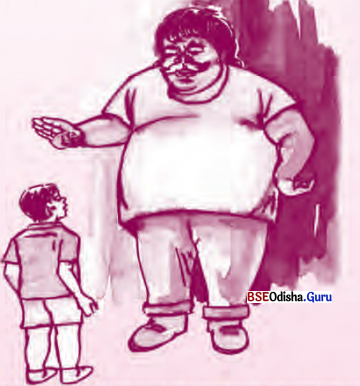


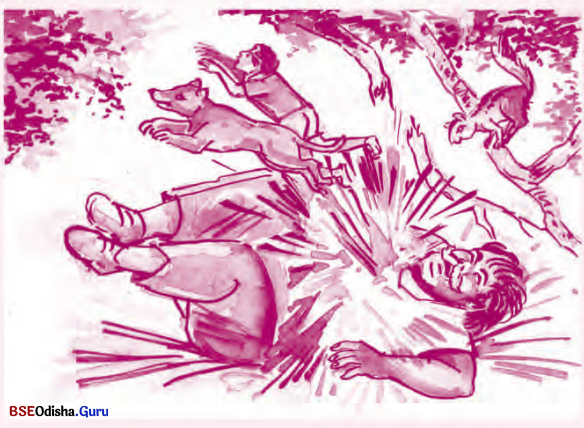

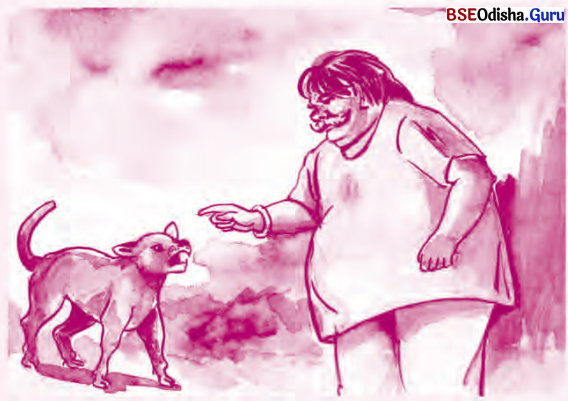

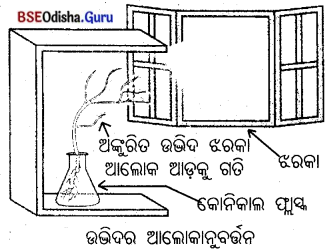

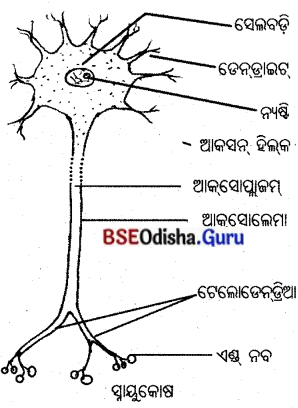
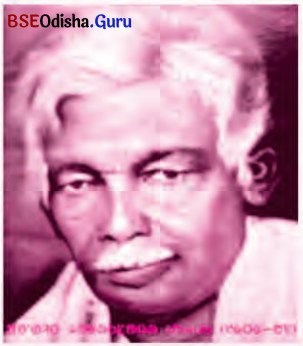


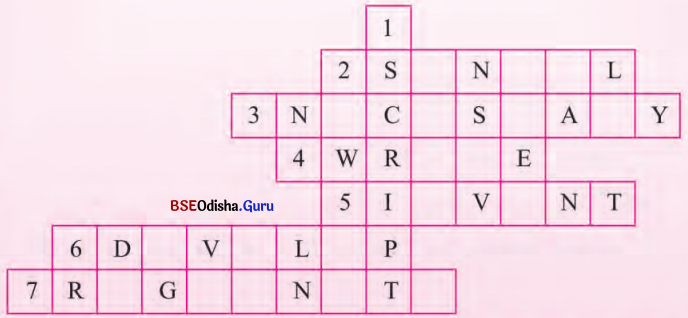
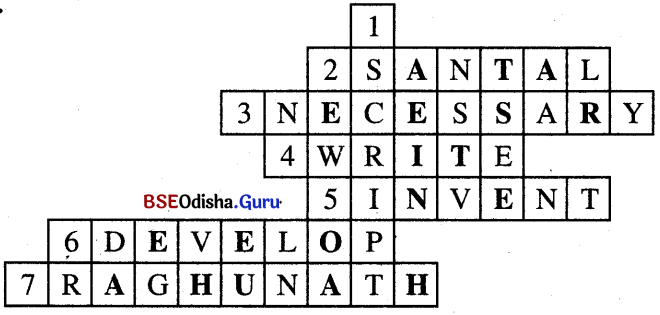
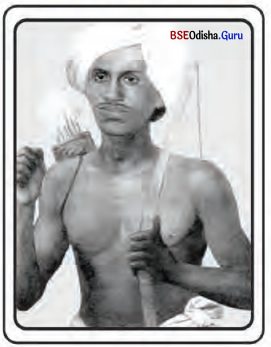 (ତୁମେ କେତେକ ମହାନ୍ ବ୍ୟକ୍ତିଙ୍କ ନାମ ଜାଣିଛ କି ଯେଉଁମାନେ କି ବ୍ରିଟିଶ୍ମାନଙ୍କଠାରୁ ଆମ ଦେଶକୁ ମୁକ୍ତ କରିବା ନିମିତ୍ତ ଲଢ଼େଇ କରିଥିଲେ । ଆମ ଦେଶମାତୃକାର ମୁକ୍ତି ସଂଗ୍ରାମରେ ଜୀବନ ଦେଇଥିବା କେତେକ ଆଦିବାସୀ ନେତାଙ୍କର ନାମ କହିପାରିବ କି ?)
(ତୁମେ କେତେକ ମହାନ୍ ବ୍ୟକ୍ତିଙ୍କ ନାମ ଜାଣିଛ କି ଯେଉଁମାନେ କି ବ୍ରିଟିଶ୍ମାନଙ୍କଠାରୁ ଆମ ଦେଶକୁ ମୁକ୍ତ କରିବା ନିମିତ୍ତ ଲଢ଼େଇ କରିଥିଲେ । ଆମ ଦେଶମାତୃକାର ମୁକ୍ତି ସଂଗ୍ରାମରେ ଜୀବନ ଦେଇଥିବା କେତେକ ଆଦିବାସୀ ନେତାଙ୍କର ନାମ କହିପାରିବ କି ?)